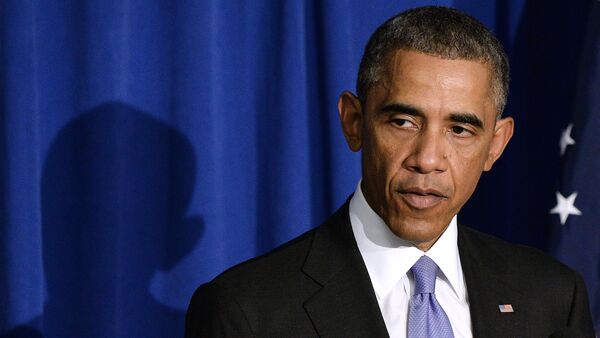MOSCOW, November 10 (Sputnik) – Pivot to Asia, a once signature foreign policy initiative of the Obama administration, does not seem to rank high on the US agenda at a time when China is increasingly assertive in the Asia-Pacific region and by extension in the world, David J. Lynch points out in an opinion piece published by Bloomberg.
One of the primary reasons for that is the lack of qualified experts on China among the high ranking US politicians. “Several key positions on Obama’s China team, including the senior positions in the White House, the State Department, and the Pentagon, are currently being held by “young people” who don’t have long-term experience in dealing with China policy or even working within the government,” stressed Zheng Wang, the Director of the Center for Peace and Conflict Studies at Seton Hall University in New Jersey.
Former US State Secretary Hillary Clinton was one of the architects of the pivot to Asia initiative. She insisted that US commitment in Asia-Pacific is essential. “It will help build that architecture and pay dividends for continued American leadership well into this century, just as our post-World War II commitment to building a comprehensive and lasting transatlantic network of institutions and relationships has paid off many times over — and continues to do so. The time has come for the United States to make similar investments as a Pacific power, a strategic course set by President Barack Obama from the outset of his administration and one that is already yielding benefits,” she wrote in a major piece “America's Pacific Century” published in Foreign Policy Magazine in 2011.
Clinton’s tenure as the US Secretary of State ended in 2013. John Kerry, her successor, has primarily been focused on the Middle East, where the US is currently actively engaged in a campaign to degrade and destroy the Islamic State, a radical Sunni group. Former US Treasury Secretary Timothy Geithner, who studied Mandarin at college, was another prominent US official, key to the country’s relations with China. He left the Obama administration in January 2013. US ambassador to China, former Senator Max Baucus, does not speak Mandarin unlike his two predecessors. He even admitted that he is “no real expert on China” in January 2014. The top regional official at the US State Department specializes in Japan, a key US ally in the region.
“The administration was heavy on China people in the first few years, and now we seem to be completely devoid of them,” Jon Huntsman, former US ambassador to China, told Bloomberg. “I think the president has assessed that there’s no political upside to managing the relationship beyond just the status quo,” he maintained.
Meanwhile, China has become increasingly assertive in its foreign policy. For instance, in recent years, it has engaged in several territorial disputes, including with US allies. China’s relations with Japan have been marred by a row over the Diaoyu/ Senkaku island.
Administration officials challenge such assertions of any major changes in the US foreign policy. They point to the fact that Barack Obama has spent more time with Chinese leaders than his predecessors since 1979. “Our extensive interaction with Chinese authorities and our focus on U.S.-China relations is the same in the second term as it was in the first,” Patrick Ventrell, a deputy NSC spokesman, told Bloomberg. “Our commitment to the Asia-Pacific rebalance strategy is stronger than ever,” he added.
Barack Obama will attend the APEC summit in Beijing on November 10 — 11 and meet with China’s President Xi Jinping on November 12. Some experts say the meeting will have no major significance, because China might view Obama as an outgoing president with no real initiative. “Nothing much will happen because the Chinese have decided that they have two years to push the envelope, change facts on the ground and present the new administration with a new baseline,” an anonymous senior Asian diplomat told the New York Times.
However, it is precisely for this matter that Obama and Xi should attempt to “find a mechanism to salvage the remaining time of Obama’s administration to benefit both nations’ interests, and the world’s interests, as to not let the next two years become “garbage time,” Zheng Wang insists. “The U.S.–China relationship has entered a very important junction and may not be able to wait another two years for new leadership to replace the Obama administration in Washington.”


